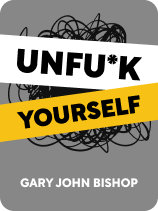

This article is an excerpt from the Shortform book guide to "Unfu*k Yourself" by Gary John Bishop. Shortform has the world's best summaries and analyses of books you should be reading.
Like this article? Sign up for a free trial here.
What are some positive affirmations for achieving goals? How can you use these affirmations in your daily life to achieve the best results?
The self-help book Unfu*k Yourself introduces positive affirmations that address the challenges you’ll encounter as you take steps toward self-improvement in life. Specifically, author Gary John Bishop provides affirmations for achieving goals when you encounter setbacks or low motivation.
Read on to discover Bishop’s two affirmations for achieving goals and how to apply them in your life.
Affirmations for Achieving Goals
According to Gary John Bishop’s book Unfu*k Yourself, positive affirmations are simple tools for anyone who wants to make profound changes in their life. He says that any growth or achievement requires you to go beyond your comfort zone and accept some amount of risk. As you grow, change, and pursue your goals in life, Bishop claims that you will encounter resistance. To counteract the resistance, he provides affirmations for achieving goals and staying on track.
In this article, we’ll describe two of Bishop’s positive affirmations for achieving goals and how he says you should apply them to your life to get the best results.
You Can Handle This
Affirmation: “I got this.”
Best used: When things don’t go your way
This affirmation is all about putting challenges into perspective when you’re trying to achieve your goals, not letting them loom larger than they really are. You’ve dealt with setbacks and found solutions before, Bishop counsels, and you can do it again. The key is taking each problem on its own terms, not allowing feelings of overwhelm or failure to spread and affect your overall outlook.
Bishop explains how to use actual evidence from your past to give weight to the affirmation, “I got this.” Imagine your whole life stretched along a timeline from past to future, and visualize yourself walking along, reviewing all the times in the past that you had problems and overcame them. Along with the disappointments, this helps you review your greatest successes. The point is that life is full of ups and downs, and eventually the current incident you’re dealing with will take its place in the gallery with all the rest. Use this affirmation to help you achieve your goals when unexpected challenges pop up, and don’t let yourself get derailed.
(Shortform note: This tendency your mind has to leap to a false conclusion when something goes wrong—”It’s all ruined! I can’t get anything right!”—is an example of what cognitive therapy calls globalizing or overgeneralizing. In Cognitive Behavior Therapy: Basics and Beyond, Judith S. Beck explains that you can counter a globalizing thought by replacing itt with a more realistic one like, “This setback is disappointing, but the project can still succeed.” The idea is to shrink the problem back down to its proper size, which is the same work that Bishop’s phrase is performing, as the wording “I got this” implies the challenge in question is manageable.)
You Are Stronger Than Your Negative Thoughts
Affirmation: “I am not my thoughts; I am what I do.”
Best used: When motivation runs out and negative thoughts take over
Bishop insists that your actions don’t have to match your thoughts and feelings—so you can still act in your best interest, even when you’re feeling low. In fact, he says, by taking productive action, you actually build confidence and self-trust that reinforce the positive beliefs you’re working to instill.
To use this affirmation to overcome negative thoughts and achieve your goals, it’s not that you ignore what you’re thinking and feeling, but rather that you understand your thoughts as one minor part of the whole picture, which doesn’t have to dictate what you do. Bishop acknowledges that the work of changing your unconscious mind through self-exploration and assertive self-talk takes time. As you’re on the journey, there will be times when the old beliefs and unproductive self-talk resurface. The key, according to Bishop, is not to let that stop you from taking the steps you know will get you closer to your goals. If you wait for the right mood or state of mind to come along before moving forward, he says, you’ll never get started.
Though Bishop doesn’t say so explicitly, you can understand this affirmation as an aspect of another affirmation, “I am relentless.” If being relentless is the general attitude that lets you confront adversity as you strive to achieve your goals, the affirmation “I am not my thoughts” addresses a specific category of obstacle: the one presented by your own state of mind.
| Which Comes First: Thoughts or Actions? In line with some readers’ criticism that Bishop contradicts himself at times, this advice to take action despite your thoughts seems to counter the premise that thoughts determine what you do and how you experience reality. Either might be true: Scientific studies continue to explore how your thoughts, feelings, and actions can all influence each other—the relationship is complex. So it makes sense that in order to maximize progress you might want to come at it from more than one angle. James Clear acknowledges this paradox in Atomic Habits. He emphasizes that in order to successfully establish a new habit, it has to align with your sense of who you are—but the way to shift your sense of identity is by doing things that someone with that identity would do. That’s why Clear says you should start by performing the tiniest possible component of each new habit, until your mind builds up enough evidence of success that your self-concept starts to shift. It’s a similar conundrum to the one that confronts Bishop’s method, perhaps because any behavior change has to happen from the inside out and the outside in simultaneously. |

———End of Preview———
Like what you just read? Read the rest of the world's best book summary and analysis of Gary John Bishop's "Unfu*k Yourself" at Shortform.
Here's what you'll find in our full Unfu*k Yourself summary:
- How your mind works and how you can use its power to your advantage
- Why your subconscious mind is actually the one calling the shots
- The seven phrases you can use to reshape your thoughts






